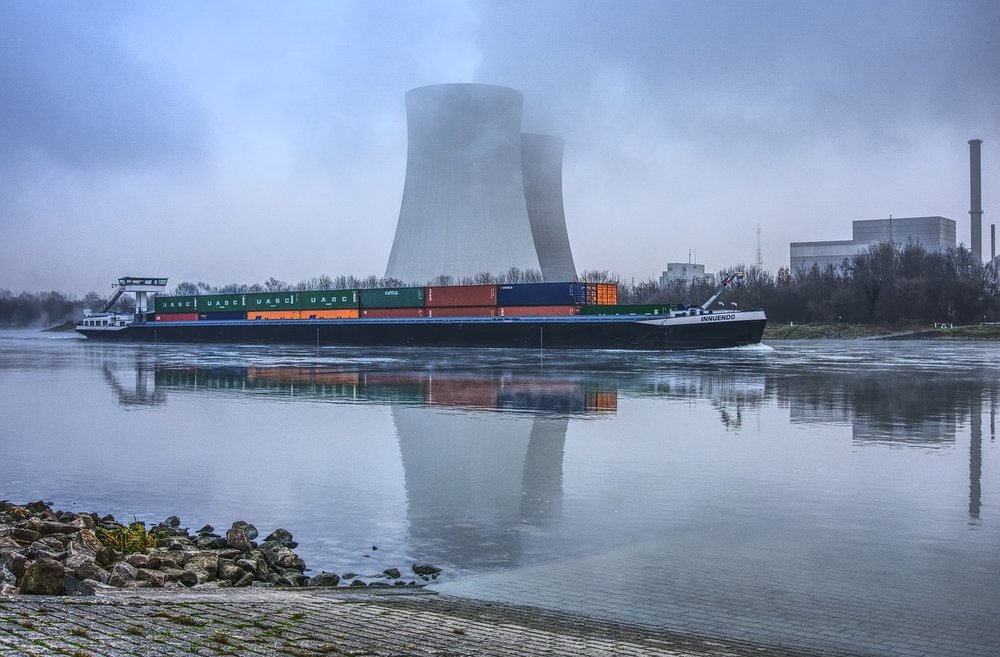An Inconvenient Necessity: The Expansion of Nuclear Energy
CJ Cowan, Online Assistant Editor
22 July, 2019
Nuclear Plant Cooling Tower
Paul Revere has already ridden past and the Redcoats are not coming, they have already arrived. The human race is losing its existential battle with climate change, and all we can realistically hope for is to brighten the looming dark age. The time for utopian solutions had passed when our parents were still in high-school, so it follows that ugly truths often require even uglier responses. The Green New Deal and initiatives like it are admirable but they have come too late and will ultimately fall short of mitigating the upcoming disaster.
We need to substantially increase our use of Nuclear Energy. This might seem impractical and mortally hazardous. While there is some validity to that assessment, it doesn't matter, as humanity must explore every solution as viable options are running out.
It is important to acknowledge the big green, radioactive elephant in the room. There has been large scale nuclear disasters in the past, but they are very infrequent and their likelihood exaggerated. The Chernobyl disaster has been discussed more fervently than usual online in recent weeks because of the premiere of the HBO limited series of the same name. It is important to realize that the accident at Chernobyl was due to a substandard, Soviet-era reactor safeguards and an unbelievable and extraordinary conflagration of human folly that led to the reactor exploding. It is also important to note that Chernobyl is the only nuclear reactor accident that has led to human death from Acute radiation exposure. No other accident of this scale has resulted in significant loss of human life including Fukushima in 2011 and Three Mile Island in 1979. It is important in this context to push back against sensationalism and accurately address the pros, cons and risks of nuclear energy in combating climate change.
There are many more dangerous forms of energy production out there.. For example, coal burning amounts to around 3000 deaths annually in the United States. These deaths result from things like industrial accidents and blacklung that coal workers suffer as well as ailments befalling the general population from coal emissions. It seems people are more focused on the dangers of remote hazards like nuclear disasters than mundane threats like fossil fuel pollution.
Further, Nuclear energy is becoming much safer with new advancements in reactors that not only offer safety advantages but also curtail proliferation of radioactive materials.
These cutting edge designs have “walk away” safety features which means that they do not need any backup power or external cooling systems. These advanced, generation reactors would rarely if ever need to be refueled, so the potential risk of materials being obtained or used in a bomb program or for terrorist organizations to produce “dirty bombs” would be greatly reduced.
The signatories of the Paris Climate Agreement agreed to a goal of limiting global temperature rise to below 2 degrees celsius over pre-industrial levels, and the International Energy Agency has advised that this will require doubling the amount of nuclear energy in the world’s collective energy consumption. Renewables are vitally important, but they cannot alone lead us to our climate goals. We need a mix of carbon free renewables and non-renewables if we are to stave off the worst of the looming climate catastrophe.
A significant drawback to this form of power generation is that building nuclear infrastructure is extremely expensive. Renewable energy continues to drop in price due to increasing amounts of research and investment, but nuclear power continues to be costly. It is estimated that it will cost USD$7 trillion for the United States to get a quarter of its electricity from Nuclear Energy. The Green New Deal is estimated to cost the taxpayer USD$93 trillion dollars, so energy expense is a relative concept.
It is important to consider that renewable energy tends to need large amounts of land, cause environmental damage, and is often dependent on natural phenomenon beyond human control like wind and sun which indifferently comes and ago regardless of the consumer’s energy needs. This latter problem has been described as “the duck curve” which concerns the difficulty of matching energy supply and demand throughout the day and night. Nuclear energy is devoid of such shortcomings. This overlooked form of energy production is emissions-free and carbon-free, but it is also the most reliable form of electricity generation. They operate 93 percent of the time—even during extreme weather where other facilities fail or curtail their operations. This particular advantage will become useful as extreme weather becomes ever more common in the present era of climate change.
Nuclear energy may create a great deal of carbon free electric power, but the power sector is not the only industry increasing the climate crisis. Electricity is only responsible for around a quarter of the United States carbon emissions annually, as other culprits such as livestock and deforestation add up to the lions share. This share is also quickly on the decline while the amount from other sectors such as transportation and agriculture are falling at a much slower rate. An argument could be made that the focus on renewables and nuclear energy may be misplaced and the legitimate issues lie with other sectors of the global economy.
In order to address climate change it will be necessary to entertain solutions and policy alternatives that are less than ideal. The era in which humans can have their cake and eat it too is swiftly coming to an end. Globally, people of all stripes cannot produce and consume with no thought for tomorrow, as this will only result in conditions that are uglier and options which are even more so. Recycling picking up litter, and turning off lights might help people absolve themselves of guilt over their impact on our climate, but those acts are small potatoes in comparison to the urgent work that needs to be done on every level of human civilization.
